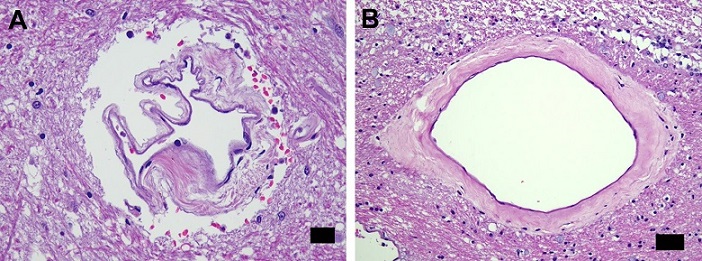Autopsy Study Shows Acute Neutrophilic Vasculitis (Leukocytoclasia) In Brains Of Those Who Died From COVID-19!
Nikhil Prasad Fact checked by:Thailand Medical News Team Feb 19, 2024 2 years, 1 day, 5 hours, 50 minutes ago
COVID-19 News: The COVID-19 pandemic has unleashed unprecedented challenges on global healthcare systems, pushing scientists and medical professionals to unravel the complexities of the novel coronavirus's impact on various organ systems. While respiratory complications have been at the forefront, the enigmatic effects of the virus on the central nervous system (CNS) have emerged as an intriguing and critical area of study. Recent autopsy studies, such as the comprehensive investigation conducted at Louisiana State University Health Sciences Center-USA and covered in this
COVID-19 News report, shed light on the neuropathological changes associated with COVID-19, with particular emphasis on the presence of acute neutrophilic vasculitis (ANV) with leukocytoclasia in the brains of individuals who succumbed to the disease.
 Acute neutrophilic vasculitis (leukocytoclasia) in COVID-19 autopsy brains
Cerebral microvasculopathy with mural collagenosis. (A) Severe mural distortion with irregular adventitial collagenosis of a microvessel in midbrain tegmentum near substantia nigra (Case 13). (B) Dilated microvessel with somewhat compact adventitial collagenosis in periventricular calcarine white matter (Case 12). Scale bars: 20 μm in (A); 50 μm in (B)
Unveiling the Neurological Impact
Acute neutrophilic vasculitis (leukocytoclasia) in COVID-19 autopsy brains
Cerebral microvasculopathy with mural collagenosis. (A) Severe mural distortion with irregular adventitial collagenosis of a microvessel in midbrain tegmentum near substantia nigra (Case 13). (B) Dilated microvessel with somewhat compact adventitial collagenosis in periventricular calcarine white matter (Case 12). Scale bars: 20 μm in (A); 50 μm in (B)
Unveiling the Neurological Impact
The neurological impact of COVID-19 has been a subject of growing concern as reports of various neurological manifestations, ranging from anosmia and headaches to more severe conditions like encephalitis, have surfaced. Autopsy studies have become a crucial tool in unraveling the mysteries of how SARS-CoV-2, the virus responsible for COVID-19, affects the brain. Such autopsy studies delve into the intricate details of brain pathology, aiming to provide a clearer understanding of the mechanisms driving CNS involvement in COVID-19.
Histopathological Insights: Acute Neutrophilic Vasculitis
The hallmark finding in these autopsy studies is the consistent presence of acute neutrophilic vasculitis with leukocytoclasia in the brains of individuals who succumbed to COVID-19. ANV, characterized by the infiltration of neutrophils into small blood vessels, is indicative of an immune-related response within the CNS. This inflammatory condition, often referred to as type 3 hypersensitivity vasculitis or leukocytoclastic vasculitis, is a distinct feature observed in all examined cases. Understanding the implications of ANV is crucial for comprehending the neuropathological landscape of COVID-19.
Unraveling Mechanisms: Beyond Direct Infection
While direct infection of brain cells by SARS-CoV-2 remains a topic of debate, the autopsy findings suggest that systemic factors play a pivotal role in neuronal injury. The study explores potential mechanisms such as hypercytokinemia, dysregulation of the renin-angiotensin system, and hypoxia. These factors, along with immune dysf
unction, may collectively contribute to the observed vasculitic changes in the brain. It highlights the need to move beyond a simplistic view of COVID-19 as solely a respiratory disease and underscores the importance of considering the broader systemic implications.
Bridging the Gap: Histopathological Complexity
Histopathological examination of COVID-19 autopsy brains goes beyond the identification of ANV, revealing additional complexities. Associated perivasculitis and microhemorrhages add layers to the neuropathological profile, resembling a type 3 hypersensitivity vasculitis model. The burden of ANV was significantly higher in COVID-19 cases compared to historical controls, emphasizing the unique pathological signature of the disease. These findings challenge researchers to explore the intricate interplay between viral infection, immune responses, and underlying comorbidities.
Exploring Potential Triggers: Comorbidities and Medications
Several factors have been proposed as potential triggers for ANV in COVID-19, including comorbidities like hypertension, microbial coinfections, and medication use. The study raises intriguing questions about the role of medications, such as anti-coagulants, in exacerbating neurological complications. The associations between microbial coinfections and ANV highlight the complexity of the disease, suggesting that a multifactorial approach is essential for understanding its neuropathological consequences.
The Complex Interplay of Immune Responses
Central to the neuropathological changes observed is the intricate interplay between the host immune response and viral infection. Immune complexes, complement activation, and genetic predispositions are identified as potential contributors to the observed vasculitic changes. The dynamic nature of immune responses, marked by fluctuations in antibody titers and cytokine levels, adds another layer of complexity to our understanding of COVID-19 neuropathology. It underscores the need for tailored therapeutic approaches that consider the evolving immune landscape in affected individuals.
Implications for Clinical Management
Recognizing the neuropathological sequelae of COVID-19 has critical implications for clinical management. The identification of ANV provides a potential target for therapeutic interventions aimed at mitigating neuroinflammation and preserving neurological function. Tailoring treatment strategies to address the unique pathophysiology of COVID-19 neuropathology becomes imperative in enhancing patient outcomes. The study's findings serve as a roadmap for clinicians navigating the intricate landscape of COVID-19 complications.
Conclusion: Navigating the Mysteries of COVID-19 Neuropathology
In conclusion, autopsy studies offer invaluable insights into the neuropathological changes associated with COVID-19. The consistent identification of ANV underscores its significance in the CNS involvement of the disease. As researchers continue to unravel the complexities of COVID-19 neuropathology, a multifaceted understanding of the interplay between viral infection, immune responses, and comorbidities emerges. Moving forward, this knowledge will be instrumental in developing targeted therapeutic strategies and refining clinical management approaches, ultimately improving outcomes for individuals grappling with the neurological consequences of COVID-19.
The study findings were published in the peer reviewed journal: Diagnostic Pathology.
https://diagnosticpathology.biomedcentral.com/articles/10.1186/s13000-024-01445-w
For the latest
COVID-19 News, keep on logging to Thailand Medical News.
